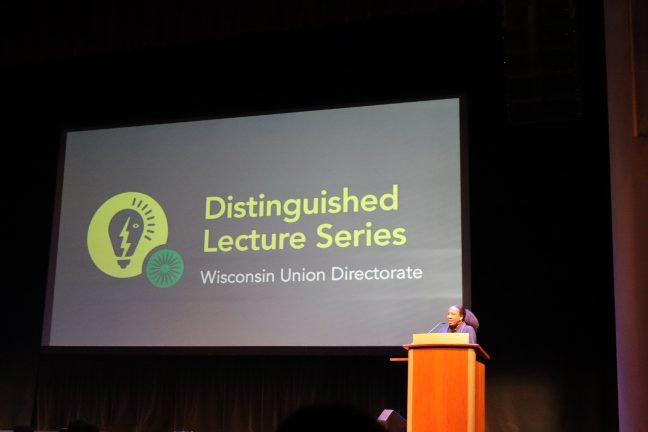Tarana Burke, the activist who founded the Me Too movement more than ten years ago, spoke to a full audience Monday night at Memorial Union about what the Me Too movement’s role is on the University of Wisconsin’s campus.
The Wisconsin Union Directorate brought Burke as part of the Distinguished Lecture Series.
Burke, who grew up in the Bronx, said her family played a strong role in shaping who she is today. She said her mother “wrapped her in Black feminist literature.”
“I realized that the information that my family gave me, gave me an ability to understand injustice, and to name it when I saw it, but it didn’t give me the tools to do anything about it,” Burke said.
Burke later found the tools to help mend injustice when she got involved with the 21st Century Youth Leadership Movement, an organization founded by veterans of the Civil Rights and Black Power Movement. It was there that Burke began organizing in her community around racial and economic justice.
Continuing her work with 21st Century, Burke worked with youth of color in Selma, Alabama. It was there that she met Heaven, a young black woman who confided in Burke about the abuse she experienced.
Burke was unable to respond at the moment and turned her away, something she immediately regretted. Now, she said, she would know how to respond in that situation.
“I saw a brief moment of disappointment in her eyes, maybe a little bit of sadness, and it still wasn’t enough for me to say wait, I just want to tell you this happened to me too,” Burke said. “The thing that nobody in my life had ever said to me, was the only thing I wanted to say to this girl and I couldn’t.”
Burke continued doing leadership development with young people. She co-founded the organization Just Be Inc. in 2003, a leadership development program for young black and brown girls. The goal of the program was to provide the language to help them articulate their experiences, the space to process what happened to them, and to help them understand that sexual violence isn’t something they had to go through alone.
In addition to direct engagement with youth, Burke created a MySpace account to interact online — something she said shifted the dynamic of the organization’s relationship with the community. She started getting messages from people thanking her for this work and reaching out for resources to use in their own communities.
“We were giving people basic organizing skills,” Burke said. “Another thing we believed was that the people with the lived experiences need to be at the forefront of the work. And so a lot of our work became about training survivors to be organizers in their own communities because we have to be in charge of making our communities [safer].”
As the Me Too movement evolved on social media, it starting having a greater impact on both national and international sexual violence dialogue, but this was not enough, Burke said. The media attention the movement generated added to some misconceptions that are almost as dangerous as the silence, she added.
Burke brought in recent examples of sexual misconduct allegations by prominent public figures and discussed the implications of the perspectives media take in discussing them.
“When we’re talking about these individual bad actors all the time, and not talking about the system that holds them up, we’re having the wrong conversation,” Burke said. “When you are talking about Kavanaugh or Weinstein or R. Kelly, the conversation should be about power and privilege. And really, what we’re dealing with is the unchecked accumulation of privilege and the misuse of power.”
While the Me Too movement is centered around individual healing and the attempt to interrupt sexual violence through community action, the mainstream conversation has shifted away from this, Burke said.
Burke also emphasized the importance of the millions of individual people who made the courageous decision to come forward with their experiences.
“For the past year and a half, people have been standing with their hands raised and we have watched everybody buzz around and talk about everybody but them,” Burke said. “There would be no Me Too without people. Every hashtag is a human being.”
Burke brought her analysis to UW — this lack of accountability and accumulation of privileges and power is not unique to Hollywood. Burke told students that UW is a community — one in which students deserve safety and protection.
Campus alerts and emails do not necessarily make a campus safer, Burke said. Reading off UW’s mission statement, Burke challenged the administration to think about how they will work to prevent sexual and racial violence.
“If nobody has said this to you and apparently nobody is saying this at Wisconsin, I’m saying it to you tonight: In this community you deserve safety and you deserve protection,” Burke said. “There should be an inherent commitment [by] the school to provide that for you. There should be an inherent commitment to make this community less vulnerable to sexual violence. But based on the conversations that I have had today, there is not.”


